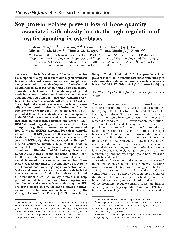摘要
In both rodents and humans, excessive consumption of a typical Western diet high in saturated fats and cholesterol is known to result in disruption of energy metabolism and development of obesity and insulin resistance. However, how these high-fat, energy-dense diets affect bone development, morphology, and modeling is poorly understood. Here we show that male weanling rats fed a high-fat (HF) diet containing 45% fat and 0.5% cholesterol made with casein (HF-Cas) for 6 wk displayed a significant increase in bone marrow adiposity and insulin resistance. Substitution of casein with soy protein isolate (SPI) in the HF diet (HF-SPI) prevented these effects. Maintenance of bone quantity in the SPI-fed rats was associated with increased undercarboxylated osteocalcin secretion and altered JNK/IRS1/Akt insulin signaling in osteoblasts. The HF-Cas group had significantly greater serum nonesterified free fatty acid (NEFA) concentrations than controls, whereas the HF-SPI prevented this increase. In vitro treatment of osteoblasts or mesenchymal stromal ST2 cells with NEFAs significantly decreased insulin signaling. An isoflavone mixture similar to that found in serum of HF-SPI rats significantly increased in vitro osteoblast proliferation and blocked significantly reduced NEFA-induced insulin resistance. Finally, insulin/IGF1 was able to increase both osteoblast activity and differentiation in a set of in vitro studies. These results suggest that high-fat feeding may disrupt bone development and modeling; high concentrations of NEFAs and insulin resistance occurring with high fat intake are mediators of reduced osteoblast activity and differentiation; diets high in soy protein may help prevent high dietary fat-induced bone impairments; and the molecular mechanisms underlying the SPI-protective effects involve isoflavone-induced normalization of insulin signaling in bone.Chen, J.-R., Zhang, J., Lazarenko, O. P., Cao, J. J., Blackburn, M. L., Badger, T. M., Ronis, M. J. J. Soy protein isolates prevent loss of bone quantity associated with obesity in rats through regulation of insulin signaling in osteoblasts.
- 出版日期2013-9
